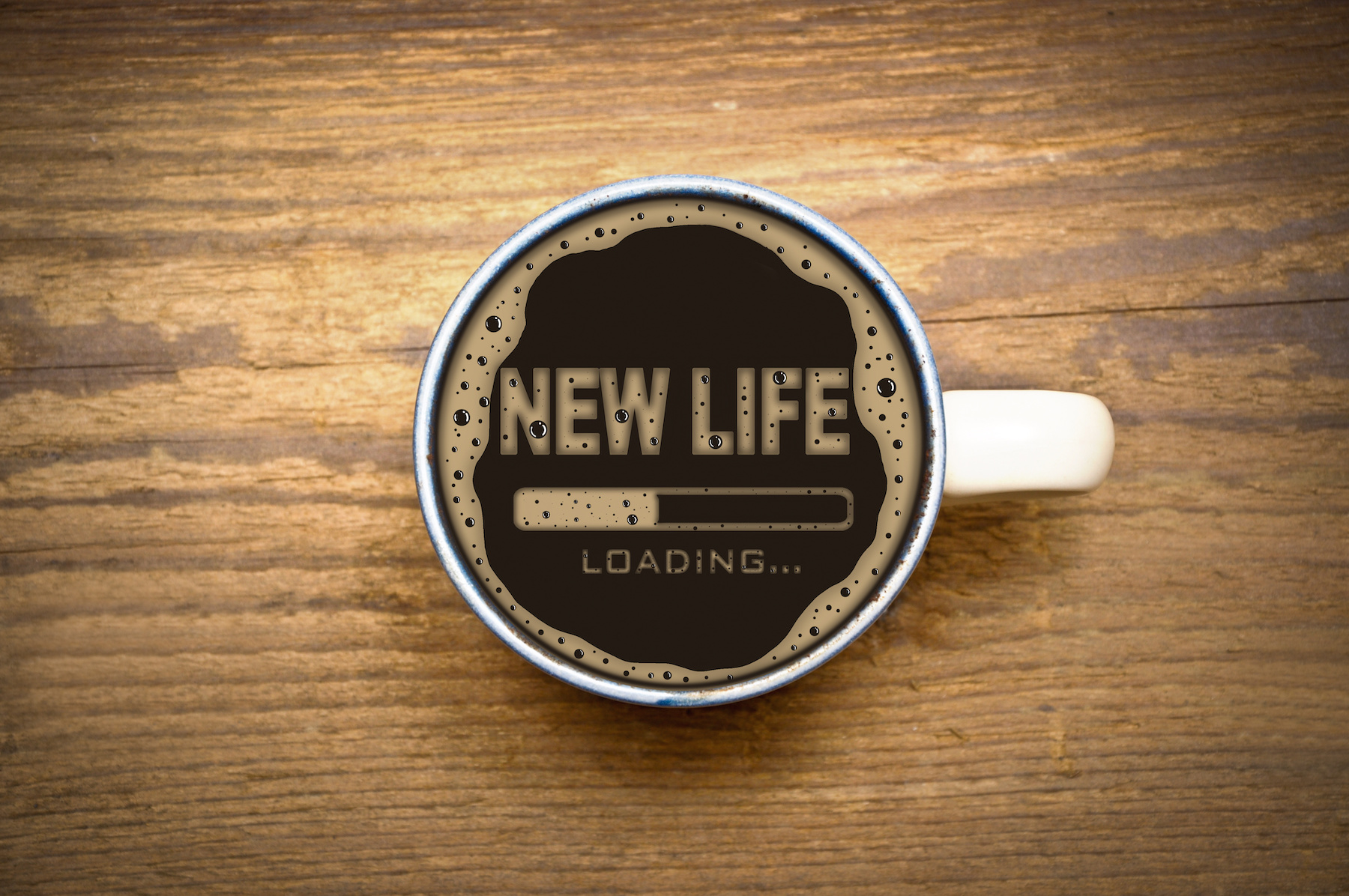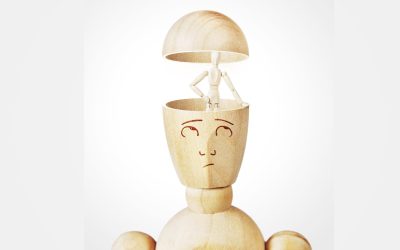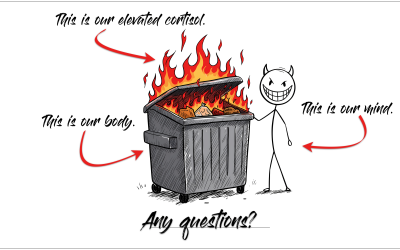Yoga as Lifestyle Medicine

A Fundamental Antidote To Chronic Stress
If you’ve made it this far into my blog, you have a basic understanding that yoga is not simply about standing on your head, or that it even requires a yoga mat. And hopefully you also have learned that Cortisol – known informally as the “stress hormone” – is first activated in the mind, not the adrenal glands.
Sustained or chronic cortisol levels put us on a path to a long list of health risks and disease. The Niyamas help us understand how we are empowered to manage stress in the mind – and, thus, manage our cortisol levels naturally, which is important for both brain health and heart health.
The Niyamas are the second limb of the “Eight Limbs of Yoga” – a starter kit, of sorts, within the greater path laid out by the Yoga Sutras. Niyama is Sanskrit for: rules, guidelines, or observances.
This particular limb and yoga sutra is a list of lifestyle principles designed to purify the mind, body and spirit, reduce distractions, and create an awareness of personal integrity.
Sutra 2.32:
The Niyamas – lifestyle principles:
1. Shaucha – Purity, cleanliness (in body, mind and spirit)
2. Santosha – Contentment, gratitude
3. Tapas – Discipline, self-control
4. Svadhyaya – Self-study or self-reflection
5. Ishvara Pranidhana – Surrender to a higher power, letting go
Here too, when we start by exploring these through the lens looking at ourself, then it becomes easier to apply them to others in relationship.
More often than not, we are harder on ourselves than others. That self-judgment narrative loop in our minds becomes a constant source or ‘current’ of stress experienced by the body, in our daily life.
If you don’t happen to have a self judgment practice in your mind, that’s fantastic! Whew! Perhaps your chronic stress comes from unnecessary expectations you haven’t met… And how is your external outlook when it comes to judgment of others? Do you find yourself frustrated or angry from a disappointment loop in your mind that is active in your day to day relationships?
With the first step of awareness, we look to the Niyamas – guidelines and observances, that can help bring us to a more neutral state of equanimity.
“There is nothing either good or bad, but thinking makes it so.”
EVEN THE BARD UNDERSTANDS YOGA!
Here are some examples of how the Niyamas may be applied to daily life:
1. Saucha – Purity, cleanliness (in body, mind and spirit); caring for our body – internally and externally; becoming aware of toxic self talk and ‘cleaning up our own shit’ before judging others; limiting exposure to violence or the news; cleaning up clutter in our space to feel more peaceful.
2. Santosha – Contentment, gratitude; physically touching your heart or activating self love daily – just like brushing your teeth…; when everything seems to be going wrong, can you take a step back and practice perspective on a glass half full instead of half empty, draw focus of the mind to clearly see the things that are going okay; accept the mystery of change and welcome growth; this sutra is a core principle of practicing perspective a.k.a. mindfulness.
The last three principles of this sutra are also referred to as “Kriya Yoga”. Just remember this as a 3-step process of the 3 ‘R’s:
- Refine (Tapas) – the discipline to do the practice routinely
- Reflect (Svadhyaya) – notice, raise awareness how it feels, perhaps modify a.k.a. ‘rinse and repeat’
- Release (Ishvara Pranidhana) – let go of self-judgment, surrender to what is, leave the practice and move on to the next practice
We find this three-step process at work in any sport or endeavor that calls for practice. So why not do it with the mind activity?
The Niyamas, rich in contemplation and action, are a key starting point in a practice of perspective. Exploring the sister limb of the Yamas – Relationship Principles, makes for a more solid foundation of our yoga path. We can set free the objective of right path and wrong path and find a more peaceful path forward.
Putting It All Into Practice
1. Saucha – Hygiene as a practice of self-care, rather than a chore; washing your body is caring for yourself and for others around you. Brushing your teeth, your hair and even dry-brushing your body are practices of cleansing that can affect your current state – especially, when you feel them as a habit.
2. Santosha – starting a daily gratitude journal and committing for just two weeks and see how it feels.
All it takes is one minute daily.
Each morning or at bedtime, jot down 3 things you are grateful for in that moment.
Just start by looking around your room, raise awareness of even the seemingly smallest thing you see that brings you happiness or security – do you have a room, do you have a pillow, do you have a warm cup of tea or coffee or snacks; a pair of strappy sandals or sneakers that you love to wear; is someone who cares about you texting you; do you have a favorite TV show that brings you excitement and joy; be grateful for warm memories you can conjure up that bring a burst of butterflies in your heart; do you see items around you that remind you of people or past experiences that bring you joy in this moment…?
Are you grateful for newfound wisdom in the yoga sutras teaching about this santosha practice…?
Careful not to overthink and assess, just write from the heart that you are grateful for anything. Write. One minute [or more…]. Move on with your day or go to bed. That’s it.
And remember, this is a process of neuroplasticity in the brain, so when practiced repeatedly over time it will shift your mindset or beliefs naturally and create a reflex to reduce stress more instantly.
Bonus grounding practice: see if adding the word ‘yet’ to your self-limiting beliefs makes a difference in how you feel about the thought currently looping in your mind:
I can’t do [this] right – YET.
I can’t get through to my partner – YET.
I don’t have enough money – YET.
I don’t like my job – YET. I don’t have my dream job YET.
I’ll never be healthy – I’m not fully healthy YET.
I can’t lose weight – YET.
Yes, this points to a place in the future, but it is a truth you can actually experience in this present moment BECAUSE you truly don’t know what the future holds. If you’ve been repeating a negative outcome of the future in your head, how’s that workin’ for you…? Why wouldn’t flipping the script and keeping an open mind narrative about the future be worth the practice…? (Mic drop.)
3.Refine (Tapas), Reflect (Svadhyaya), Release (Ishvara Pranidhana):
Choosing any of the above 2 Niyama practices (Saucha and Santosha) and committing to that new routine will flow through the latter three Niyamas –
REFINE – any new effort or practice;
REFLECT – how does it feel after one day, 5 days, 14 days?
RELEASE – let go of expectations and trust in other powers and mysteries that are supporting you, you just don’t see them with your eyes.
Suffering is Optional
To Klesha is To Human The Five kleshas (Yoga Sutra 2.3) are mental afflictions or obstacles that cloud the lens through which we are currently viewing a situation, person, or thing, and keep us stuck in cycles of suffering. We are all born with these kleshas. This...
Rapidfire Research on Meditation
Alright, so research is super boring to many of us in jobs without goggles and white lab coats, but….. Spoiler Alert! Meditation offers a multitude of health benefits, encompassing both mental and physical well-being – and including both structural and functional changes to certain brain regions.
Asmita: The Ego That Thinks It’s the Star of the Show
The 2nd Klesha is Asmita: Yoga, Ego, and the Art of not Being a Self-Centered Diva or Jerk. We’ll cover each of the five kleshas in this series about why Suffering is Optional.
Avidya: Because Who Doesn’t Love a Good Delusion?
The 1st Klesha is Avidya: It’s the queen of the kleshas, ground zero of all the other kleshas. We’ll cover each of the five kleshas in this series about why Suffering is Optional.
Practicing Perspective for Chronic Stress: Cortisol and Dumpster Fires
Cortisol is a hormone produced by the adrenal glands in response to stress. Certain thoughts or perspectives have the power to turn up the dial of stress throughout our whole bodily system – from something that only exists in the mind.
Relationships Are Primary, Everything Else is Derivative
My aha moment could be yours too.
The first time I realized how yoga was actually working in my life – off the mat, beyond the body – was noticing how I felt in my…





